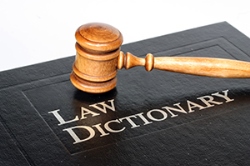Standing Out in the Crowd – Part 2
 Last month, I was looking at the motto of the Olympic Games (“Swifter, Higher, Stronger”) and indicated that it didn’t just apply to Olympians but to anyone who wanted to be the best, or at least be amongst the best, in whatever sphere where they wanted to excel. But, like with anything worthwhile, you have to work at it; it won’t be handed to you on a plate.
Last month, I was looking at the motto of the Olympic Games (“Swifter, Higher, Stronger”) and indicated that it didn’t just apply to Olympians but to anyone who wanted to be the best, or at least be amongst the best, in whatever sphere where they wanted to excel. But, like with anything worthwhile, you have to work at it; it won’t be handed to you on a plate.
So, the first essential that you must work towards is “determination”. It’s logic – if you don’t really want to succeed, then you’re not going to! Being a really successful Legal Secretary is not governed by chance – it’s governed by you. Only you can make it happen. Here’s something to think about: “What makes a star a star?” Well, one answer could be that it sparkles! Ask yourself, “What will make me sparkle in my job?” You spend a large part of your life at work, so it makes sense to invest in it.


 There is no denying that working as a Legal Secretary can prove to be an exceptionally exciting and rewarding career choice. If you are involved in dealing with litigation cases, you should find that no two days are ever the same. Even more important, those dreadful Monday morning blues will hopefully become a thing of the past when you actively look forward to turning up for your job at the start of a brand-new week.
There is no denying that working as a Legal Secretary can prove to be an exceptionally exciting and rewarding career choice. If you are involved in dealing with litigation cases, you should find that no two days are ever the same. Even more important, those dreadful Monday morning blues will hopefully become a thing of the past when you actively look forward to turning up for your job at the start of a brand-new week.  “Citius, Altius, Fortius”
“Citius, Altius, Fortius” Dealing with clients can be one of the most challenging aspects of legal practice. Some clients can be patient and appreciative of your work, whilst others can be very hard to satisfy, demanding, stressful and upsetting. Clients may even not pay their fees, complain to the Law Society or sue for negligence if they feel that they have been treated unfairly.
Dealing with clients can be one of the most challenging aspects of legal practice. Some clients can be patient and appreciative of your work, whilst others can be very hard to satisfy, demanding, stressful and upsetting. Clients may even not pay their fees, complain to the Law Society or sue for negligence if they feel that they have been treated unfairly.  When we are passionate about our careers we naturally look into ways of improving our practice. Continuing professional development is a process which encourages that improvement and is widely recognised as an integral part of professional progression. Through continuing professional development we can advance, refine and reflect on the work that we do, encouraging more effective practice and greater rewards in the future. It is a self-directed and ongoing process which allows the individual to become empowered to take charge of their career and steer it in the direction they want it to go.
When we are passionate about our careers we naturally look into ways of improving our practice. Continuing professional development is a process which encourages that improvement and is widely recognised as an integral part of professional progression. Through continuing professional development we can advance, refine and reflect on the work that we do, encouraging more effective practice and greater rewards in the future. It is a self-directed and ongoing process which allows the individual to become empowered to take charge of their career and steer it in the direction they want it to go. Have you ever wished you could remember all the new names, faces, numbers, addresses, images and tasks that you come across every day of your life? Imagine the time saved and embarrassing moments spared if you could remember every detail of every day. Unfortunately, experts agree that a perfect photographic memory is a thing of fiction. This is not to say that you cannot allow yourself to have a brilliant memory, it just means that, like all things worth achieving, having a good memory will take a bit of practice.
Have you ever wished you could remember all the new names, faces, numbers, addresses, images and tasks that you come across every day of your life? Imagine the time saved and embarrassing moments spared if you could remember every detail of every day. Unfortunately, experts agree that a perfect photographic memory is a thing of fiction. This is not to say that you cannot allow yourself to have a brilliant memory, it just means that, like all things worth achieving, having a good memory will take a bit of practice. Roman Law is the legal system invented by the Romans more than 2,000 years ago. Having undergone the process of transformation and reinterpretation, Roman Law continues to influence legal thinking and legal practice to this day.
Roman Law is the legal system invented by the Romans more than 2,000 years ago. Having undergone the process of transformation and reinterpretation, Roman Law continues to influence legal thinking and legal practice to this day. One of the great things about the Institute of Legal Secretaries and PAs is the fact that they present you with a choice to either study many different areas of law through their
One of the great things about the Institute of Legal Secretaries and PAs is the fact that they present you with a choice to either study many different areas of law through their  Good communication skills are a key part of being successful. Being able to effectively communicate as an individual or in a team will help you to generate good relationships between individuals, better understand objectives and resolve problems more easily. We are all capable of communicating effectively and use a range of different skills to achieve this every day.
Good communication skills are a key part of being successful. Being able to effectively communicate as an individual or in a team will help you to generate good relationships between individuals, better understand objectives and resolve problems more easily. We are all capable of communicating effectively and use a range of different skills to achieve this every day.  Assertiveness is a direct, honest and respectful way of behaving and interacting with others. It is seen as one of the most desirable forms of human behaviour as it leads to honest and healthy relationships. As a Legal Secretary, the ability to be assertive will help you greatly in your career to communicate effectively with your colleagues and boss.
Assertiveness is a direct, honest and respectful way of behaving and interacting with others. It is seen as one of the most desirable forms of human behaviour as it leads to honest and healthy relationships. As a Legal Secretary, the ability to be assertive will help you greatly in your career to communicate effectively with your colleagues and boss.